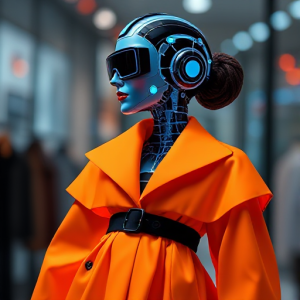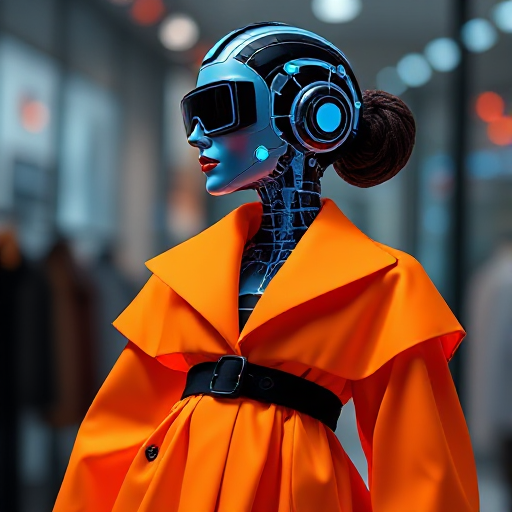
Within the fast-paced and ever-evolving world of fashion, staying ahead of trends and meeting consumer demands has always been a challenge. Fashion marketers, designers, and brands are increasingly turning to Artificial Intelligence (AI) as a game-changing tool to streamline processes, predict trends, enhance customer experiences, and optimize marketing strategies. In this article, we’ll explore how AI is transforming fashion marketing, its benefits, challenges, and its future potential.
What is AI in Fashion Marketing?
AI in fashion marketing refers to the use of machine learning, data analytics, and other AI technologies to enhance the way fashion brands interact with their customers, predict trends, optimize supply chains, and personalize experiences. From chatbots to predictive analytics, AI tools are being employed across various aspects of fashion marketing to improve efficiency and customer satisfaction.
Key Applications of AI in Fashion Marketing
1. Personalized Shopping Experience
One of the most significant benefits of AI is its ability to create personalized experiences for customers. By analyzing data from consumer behavior, purchase history, and browsing patterns, AI can recommend products that a customer is most likely to purchase. Personalized recommendations not only improve customer satisfaction but also increase sales and loyalty.
Example: Online retailers like Amazon and ASOS use AI-powered recommendation engines that suggest items based on the customer’s browsing and purchase history. This technology is a direct result of machine learning algorithms that continuously evolve based on data.
2. Predictive Analytics for Trend Forecasting
Fashion is a rapidly changing industry where trends evolve season after season. AI tools help predict upcoming trends by analyzing social media conversations, fashion shows, consumer preferences, and even weather patterns. These tools can forecast which styles, colors, fabrics, or designs are likely to be popular in the coming months, giving brands a competitive edge in product development.
Example: Platforms like Heuritech use AI to analyze images from social media platforms like Instagram and fashion blogs to predict trends and inform brands about what consumers want before it hits the mainstream.
3. AI-Powered Chatbots and Virtual Assistants
Customer service is an essential part of fashion marketing, and AI chatbots are revolutionizing this aspect. AI-powered chatbots can assist customers in finding the perfect product, provide style advice, track orders, and answer frequently asked questions, all without human intervention. This round-the-clock service improves customer satisfaction and reduces operational costs for brands.
Example: Luxury brand Tommy Hilfiger uses AI chatbots to engage with online shoppers, guiding them through the purchasing process and offering personalized suggestions based on their preferences.
4. Inventory Management and Demand Forecasting
Managing inventory efficiently is a crucial part of fashion marketing. AI helps brands optimize their inventory by predicting demand for particular items based on historical sales data, seasonality, and trends. With this predictive capability, companies can avoid overstocking or understocking products, reducing waste and maximizing profits.
Example: Retail giant Zara uses AI for demand forecasting to ensure that the right amount of products are available at the right time. This reduces unsold inventory and ensures that products are available when customers want them.
5. Automated Content Creation
Creating content at scale is a time-consuming task for fashion brands, especially for social media and online advertising. AI tools can help automate content creation by generating product descriptions, ad copy, and even fashion photoshoots through image recognition and synthesis. These tools save time and allow marketers to focus on strategic initiatives.
Example: AI platforms like Copy.ai can generate product descriptions for clothing items, saving brands time and effort in creating compelling content for their online stores.
6. Visual Search and Image Recognition
In the age of social media, visual content is king. AI-powered image recognition technology allows consumers to search for products by uploading photos or using images to find similar items. This visual search technology is especially helpful for fashion brands, as customers can find products they like based on style, color, or pattern without having to know the exact name of the item.
Example: Pinterest’s visual search feature allows users to find fashion items similar to those they see in an image, whether it’s a celebrity outfit, a street style look, or a runway trend.
7. AI-Driven Influencer Marketing
Influencer marketing has become a cornerstone of fashion marketing strategies. AI can streamline influencer identification and campaign management by analyzing social media profiles, engagement rates, and audience demographics. With AI, brands can find the most effective influencers who align with their target audience and ensure a higher return on investment (ROI).
Example: Platforms like Influencity use AI algorithms to match fashion brands with the right influencers, allowing for more precise targeting and optimized campaign results.
Benefits of Using AI in Fashion Marketing
1. Enhanced Customer Experience
AI allows for more tailored and interactive experiences, from personalized shopping recommendations to instant customer service via chatbots. This not only improves satisfaction but also encourages customer loyalty.
2. Increased Efficiency
AI-powered tools automate repetitive tasks such as content creation, inventory management, and demand forecasting, allowing fashion marketers to focus on more strategic activities. This leads to significant time and cost savings.
3. Improved Decision-Making
With access to vast amounts of data, AI provides valuable insights into customer behavior, market trends, and sales performance. Fashion brands can use this data to make informed decisions about product design, marketing strategies, and inventory management.
4. Better Marketing ROI
AI can help brands optimize their marketing campaigns by analyzing data and improving targeting. By focusing on the right audience and content, fashion brands can ensure higher conversion rates and improved ROI.
5. Sustainability
AI helps fashion brands minimize waste by predicting demand more accurately, leading to more sustainable production and inventory management. This helps brands meet the growing consumer demand for environmentally friendly practices.
Challenges in Implementing AI in Fashion Marketing
1. Data Privacy Concerns
As AI relies heavily on consumer data to provide personalized experiences, there are concerns regarding data privacy and security. Brands must ensure that they adhere to data protection laws and maintain transparency with their customers about how their data is being used.
2. High Initial Investment
Implementing AI technology can require significant upfront investment in software, infrastructure, and training. Small and medium-sized businesses may find it difficult to allocate resources for AI implementation.
3. Adapting to Change
The rapid pace of technological advancement means that fashion brands must continually adapt their AI systems to stay relevant. This can be a challenge for companies that are not equipped to keep up with these changes.
4. Dependence on Data Quality
AI is only as good as the data it is trained on. If the data is biased, incomplete, or inaccurate, it can lead to poor predictions and incorrect decisions, negatively impacting the brand’s marketing efforts.
The Future of AI in Fashion Marketing
As AI technology continues to evolve, its role in fashion marketing is expected to expand. Future developments may include even more advanced personalized experiences, deeper integration with augmented reality (AR) and virtual reality (VR) technologies, and smarter AI tools that can predict consumer behavior with even greater accuracy. Additionally, AI’s role in sustainability is likely to grow, with brands using AI to further reduce waste and increase eco-friendly practices.
AI has the potential to revolutionize the fashion marketing industry by improving customer experiences, enhancing marketing efforts, and driving operational efficiencies. From personalized recommendations to AI-powered chatbots, fashion brands are increasingly leveraging these technologies to stay competitive. However, while the benefits of AI are clear, brands must also navigate the challenges of data privacy, implementation costs, and the constant need for adaptation. With the right approach, AI can unlock new opportunities and help fashion brands thrive in an increasingly digital and data-driven world.
